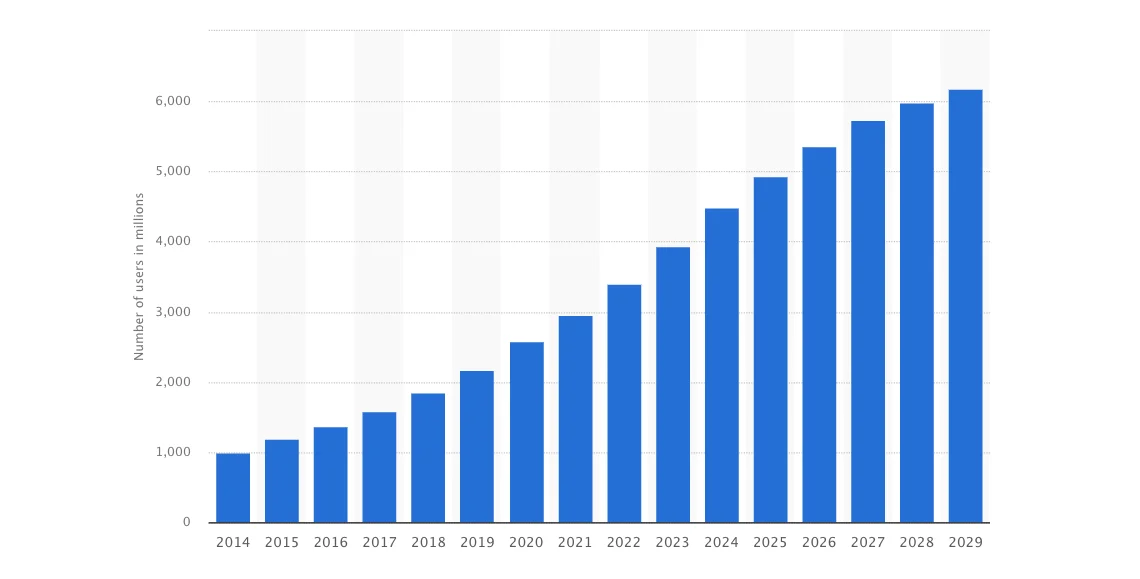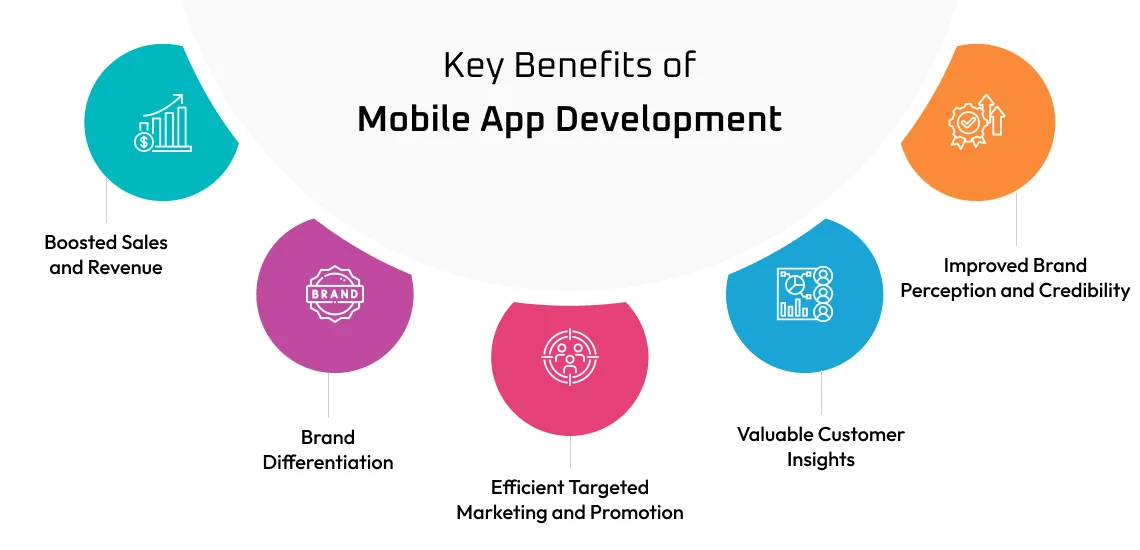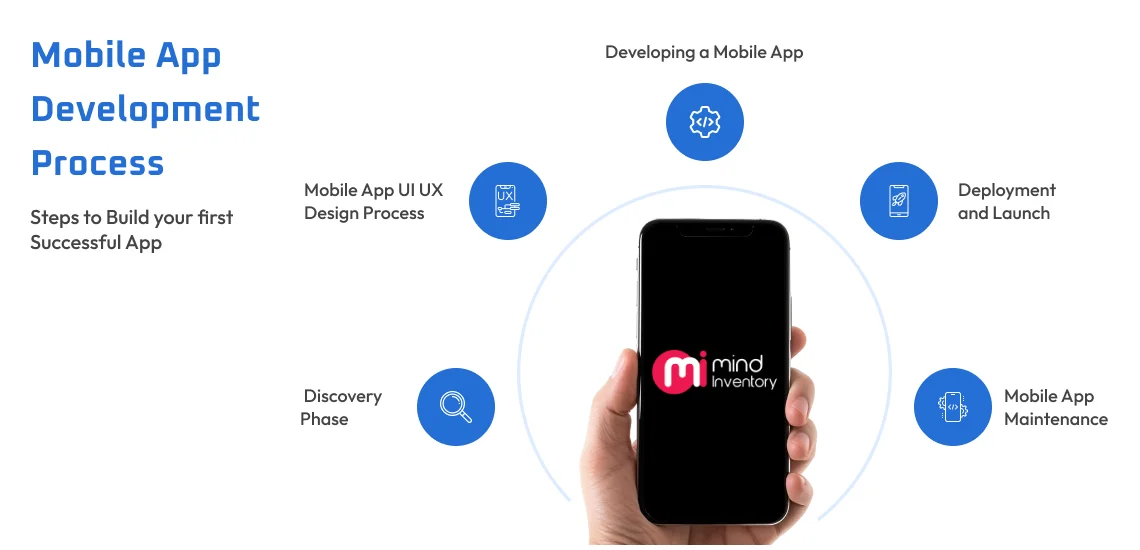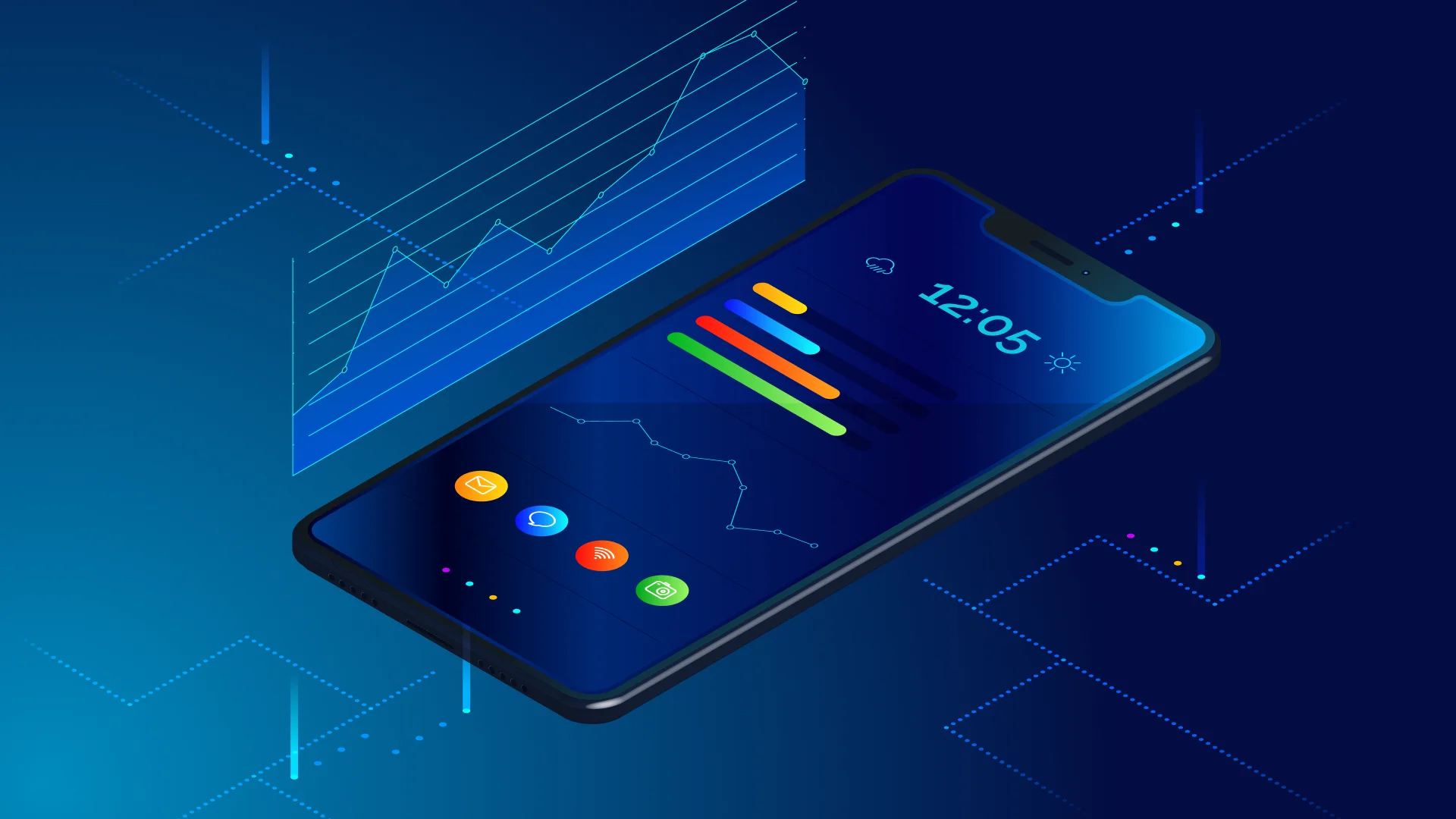A Comprehensive Guide to Mobile App Development
- Mobile
- August 27, 2024
Mobile app development has become a top priority for businesses seeking to expand their reach among smartphone users who increasingly rely on mobile devices to discover products and services. If you’re also looking to capitalize on this lucrative market, our comprehensive mobile app development guide covers everything from benefits and trends to the development process, patenting mobile app ideas, best practices, development costs, and more.
Mobile apps have transformed businesses across various industries in this mobile-first era!
- Hospitality: Airbnb
- Travel and tourism: Skyscanner
- Transportation: Uber
- Education: Duolingo
- Finance and cryptocurrency: Coinbase
- Food delivery: FoodPanda
These apps have individually generated billions of dollars in revenue, showcasing the immense potential of mobile technology for businesses across various industries. They provide businesses with a direct connection to users, offering invaluable insights into their preferences. This user data can be leveraged to tailor products and services, enhancing customer satisfaction and loyalty.
Let’s understand the impact of having a mobile app with some compelling statistics.
Mobile App Development: Statistical Market Overview

For businesses looking to seize opportunities in the rapidly evolving mobile app development market and harness mobile technology for strategic growth, here’s an insightful overview of the statistical landscape:
- By 2029, the number of smartphone users is forecasted to reach 6.2 billion, indicating a significant rise in smartphone adoption and consequently, expanding the user base for mobile apps.
- Global consumer spending on mobile apps is projected to reach $125 billion on the Apple App Store and $186 billion on Google Play Store by 2027.
- Total revenue generated from mobile apps is projected to reach a market value of USD 673.80 billion by 2027, with a CAGR of 8.83% for the forecast period of 2022-2027.
- By segment, mobile game apps make a significant contribution to global mobile app downloads. It is projected that mobile game app downloads will reach 176.1 billion by 2027.
- In terms of revenue generation, advertising stands out as a significant contributor in the mobile app sector, projected to reach a value of 451.38 billion U.S. dollars by 2027.
These mobile app usage and growth statistics not only highlight the demand for mobile apps but also illustrate how they are driving business growth.

Benefits of Mobile App Development For Businesses
Mobile app development is experiencing rapid growth with a CAGR of 13.7%, expected to reach USD 655 billion by 2031. Businesses across various industries are keenly leveraging this trend to foster their growth. Here are some key benefits of developing a mobile app for your business:

Boosted Sales and Revenue
With mobile apps, businesses have direct access to customers, enabling them to offer value-based services and products tailored to customer preferences.
Brand Differentiation
Having a mobile app allows businesses to deliver innovative experiences such as virtual try-ons, gamification, personalized interactions, and more. Mobile apps benefit various industries, including transportation, manufacturing, healthcare, and retail, by providing unique USPs or market differentiators to their mobile-first user base.
Efficient Targeted Marketing and Promotion
Many brands use customer insights, such as preferences and purchase history, to create targeted marketing campaigns. This includes sending location-based push notifications and personalized offers, leading to higher conversion rates.Valuable Customer Insights
Understanding user preferences is valuable for ROI. App usage analytics and customer feedback systems help refine marketing strategies, enhance products and services, and improve the overall app experience.
Improved Brand Perception and Credibility
A mobile app allows businesses to offer value-added services like live chat support, interactive FAQs, and convenient features, reinforcing credibility, building trust, and shaping user perception of the brand.
To discover more benefits, read our blog on the business benefits of mobile app development.
Latest Mobile App Development Trends
Whether it’s to stay ahead of the competition, meet the evolving needs of users, enhance user experience with innovative features, adapt to market changes, or leverage new opportunities to increase ROI, keeping an eye on mobile app development trends and implementing them ensures your business remains relevant to users and the market for the long term.
Just as in recent times, we have seen the skyrocketing use of artificial intelligence in various aspects of digital products. Utilizing AI in a mobile app for facilitating a recommendation engine, adaptive interface, chatbots, smart automation, predictive analytics, and more can revolutionize your service or product offering.
This trend is reflected in the global AI in the mobile app market, which is expected to grow at an exceptional CAGR of 28.6% from 2024 to 2033, reaching a market size of USD 251.1 billion by 2033.
Apart from AI/ML, some other trends to watch out for are:
- Machine Learning and Artificial Intelligence
- Predictive Analytics
- Mobile applications for wearable devices
- Internet of Things
- On-demand Apps
- Cloud-integrated Mobile Apps
Each of these trends allows you to incorporate futuristic, customer-centric features and functionalities into your app. To learn more about each trend and how to adopt them in your mobile app, read our blog on top mobile app development trends to watch out for.
How to Develop a Mobile App?
To ensure the success of your mobile app development ventures, a strategic process is essential. This ensures the smooth execution of each development phase and effective resource allocation. Below is a detailed outline of the typical mobile app development process that businesses follow:

Phase 1: Discovery Phase
This phase is critical for the entire mobile app development process as it sets the direction, scope, and objectives of your project. It empowers your team to validate the idea through thorough market research. This includes researching the target audience, competitors, their unique selling propositions, exploring market trends, conducting feasibility assessments, and more.
Based on these findings, it enables you to refine the initial mobile app idea, ensuring alignment with market demands and enhancing its potential for success. Here are the critical stages of this phase:
- Discovering and ideation
- Defining features and functionalities of your mobile app
- Choosing the Technology stack for mobile app development
Your app idea is a critical business asset, and protecting it is paramount, especially with the risk of competitors copying your concept. While not all mobile app ideas are patentable, it is crucial to understand the various aspects of patenting a mobile app idea.
For more detailed guidance, including insights into different types of patent applications, checking if your app idea has been patented, and knowing the right time to file, read our blog on How to Patent an App Idea.
Phase 2: Mobile App UI UX Design Process
UI/UX design plays a crucial role in enhancing the usability and overall user experience of a mobile app, while also reinforcing your business goals and brand identity. A well-crafted UI and intuitive UX design not only encourages users to engage deeply with the app but also fosters satisfaction and loyalty.
An optimized mobile app UI/UX design process typically includes:
- Planning your Mobile App Design
- Conducting thorough research
- Identifying target audience and user personas
- Defining specifications and requirements
- Developing sketches or wireframes to visualize app structure
- Building interactive prototypes for user testing and validation
- Focusing on continuous UX optimization throughout the design iteration
Each step in the mobile app design process involves nuanced details that can significantly enhance your mobile app’s user experience.
Phase 3: Developing a Mobile App
Once the foundation is established, the next step is to translate your vision into reality through coding. However, diving straight into full-fledged mobile app development can be risky, as not all ideas prove successful.
Developing a Minimum Viable Product (MVP) allows you to validate your concept swiftly while laying a robust groundwork for future developments. This approach enables strategic planning for future iterations, focusing on integrating features and functionalities that users find most valuable.
Here are the key steps involved in this phase of mobile app development:
- Develop an MVP
- Implement mobile app security best practices
- Conduct mobile app testing
Phase 4: Deployment and Launch
After developing an app, the next crucial step is to optimize it for app store submission. This process includes refining the app’s metadata (title, description, keywords), ensuring adherence to the store’s guidelines, and conducting beta testing to gather user feedback for final adjustments before the official launch.
Once the app is launched, the journey isn’t over for businesses; they must strategize for monetization, a topic we’ll explore further in this blog. Here are the key steps involved in the deployment and launch phase after developing a mobile app:
- Implement App Store Optimization (ASO) and launch mobile app
- Develop mobile app monetization strategies
Phase 5: Mobile App Maintenance
Mobile app maintenance is an ongoing process that encompasses tasks such as bug fixing, conducting regular security audits, applying patches, adding new features, and updating existing ones. This ensures the app remains compatible with evolving devices and operating systems.
By addressing technical, security, and usability challenges consistently, mobile app maintenance not only enhances the app’s functionality but also strengthens its competitive edge and value proposition in the market.
This is just an overview of the mobile app development process. To dive deeper into each step of every phase, read our comprehensive blog on how to develop a mobile app.

Mistakes to Avoid When Developing a Mobile App
Businesses often focus on what to do when it comes to mobile app development, but knowing what not to do is equally important. Avoiding common mistakes can help you make better decisions, improving your mobile app’s user experience, quality, ROI, and overall success.
Here are some mistakes to avoid to develop a robust, high-performing mobile app:
- Keeping your app development idea a secret
- Ambiguity over device and os support
- Neglecting user experience
- Overloading with too many app functions
- Developing an app without a clear purpose
- Ineffective marketing strategies
- Setting unrealistic time and cost expectations
- Lacking a backup plan for post-launch bugs
Although these mobile app development mistakes are often made unintentionally by the development team, being aware of them during the development process can help you avoid the complexities they cause.
Top Mobile App Development Best Practices
Apart from avoiding mistakes, adopting mobile app development best practices significantly contributes to the overall success of your mobile app. These practices enhance user experience (UX), improve app security, boost performance, and reduce development costs and time. Here are some recommended quality development practices to consider:
- Choose the technology stack based on your app’s requirements, performance expectations, and scalability needs.
- Create an intuitive, seamless, and engaging user interface with the end-user in mind.
- Protect user data and ensure app integrity by incorporating robust security measures.
- Identify and fix bugs, performance issues, and usability problems through thorough testing.
- Ensure your app architecture can handle future growth and increased user loads without compromising performance.
In addition to these recommendations, explore our detailed insights on mobile app development best practices. This resource offers further guidance on additional practices and how to effectively adopt them during the app development process.
Top Factors to Consider When Choosing a Mobile App Development Company
Mobile app development partners play a major role in the success of your project, and having an in-house team may not be ideal for most businesses. In fact, 92% of G2000 companies use IT outsourcing for their development requirements.
With the success of your mobile app at stake, finding the right mobile app development partner is critical. Here are some factors to consider when selecting a mobile app development company:
- Define Project and Business Objectives: Clearly outline your project goals, business objectives, and key requirements.
- Conduct Market Research: Analyze the market trends, competitor apps, and target audience preferences.
- Research and Shortlist Top Mobile App Development Companies: Look for companies with a proven track record, expertise in mobile app development, and positive reviews. Evaluate their portfolios and case studies.
- Write Your Job Description and Send RFP: Upon creating a detailed job description outlining your project scope, timeline, and budget, send a Request for Proposal (RFP) to the shortlisted companies.
- Assess Received Proposals and Quotations: Evaluate the proposals based on the company’s approach, expertise, and pricing.
- Conduct Meetings, Discuss Your Project, and Negotiate: Schedule meetings with the top candidates to discuss your project in detail and negotiate terms, timelines, and costs to reach a mutually beneficial agreement.
- Selection and Onboarding: Select and Onboard the company that best meets your project needs and business objectives.
If you are struggling to find the right mobile app development partner, this blog on How to Choose the Right Mobile App Development Company? will walk you through the criteria, factors to consider, mistakes to avoid when selecting, and more.

How Much Does it Cost to Develop a Mobile App?
Mobile app development is a significant financial decision for any business, regardless of the industry. This is why it becomes essential for businesses to know the ballpark figure to plan their budgets effectively.
As every mobile app concept is unique, the cost of developing it varies from $5,000 to $300,000 and more depending on the complexity of the app idea. Here is a generalized mobile app development cost breakdown based on complexity:
| Mobile App Concept Complexity | Development Cost |
| Simple Apps | $5,000 – $50,000+ |
| Medium Complex Apps | $10,000 – $150,000+ |
| High-end Complex Apps | $50,000 – $300,000+ |
Critical factors that affect the mobile app development cost are:
- App concept complexity
- App development platform
- Size and location of the development team
- Engagement model for hiring a dedicated mobile app development team
- App features & functionalities and API integrations
- MVP development or full-fledged app development
- App support & maintenance
Understanding these factors can help you get a clearer picture of what influences the overall cost of mobile app development. For a more detailed breakdown of the costs associated with each of these factors, explore our mobile app development cost guide.
Mobile App Monetization Strategies
Now that you have a mobile app, it’s crucial to strategize on monetization to boost revenue and ensure a sustainable business model. Market research indicates that in the United States, approximately 24% of apps generate revenue from advertising, 7% from paid downloads, and 12% from in-app purchases.
Apart from it, here are some of the widely adopted monetizing strategies:
- In-app Advertisement
- Email Marketing
- Paid Downloads
- Getting Sponsors on the Board
- Monetizing the Code
- SMS Marketing
- In-app Purchases
- Offering Free Versions of the App
- Content Marketing
- Multiple Payment Options for Subscribers
Each of these app monetization strategies not only enhances ROI but also provides valuable user insights and improves user engagement. Explore our blog on mobile app monetization strategies to understand each of these strategies in detail.
Boost Your Mobile App Development Efficiency With MindInventory’s Expertise
We are a leading mobile app development company specializing in native and cross-platform app development. Our team integrates the latest technologies like AI/ML, computer vision, and cloud computing into cutting-edge mobile apps, providing businesses with innovative features.
We have a team of expert mobile app developers, designers, and project managers skilled in offering a wide range of end-to-end mobile app development services, from app development consultation to UI/UX design, MVP development, and more, across various industries.
If you are planning to develop a mobile app for your business, contact our team to discuss your idea and embark on your business growth journey.
FAQ on Mobile App Development
The time required for mobile app development can range from 3 months to over 12 months, depending largely on the complexity of the app. Several factors influence this timeline, including app design intricacies, choice of platform (iOS, Android, or cross-platform), backend requirements, the size and expertise of the development team, iterations based on user feedback, and more. Each of these elements plays a critical role in determining the overall development timeline and ensuring the app meets its functional and quality objectives.
Yes, mobile app development is a profitable idea. Factors such as market demand, monetization strategies, scalability, low overhead costs, market competition, app quality, and user retention rates all contribute to the profitability of a mobile app.
When comparing in-house development with outsourcing mobile app development, outsourcing offers numerous benefits such as cost efficiency, faster time to market, flexibility in scaling teams, continuous support, global perspective, and more.













